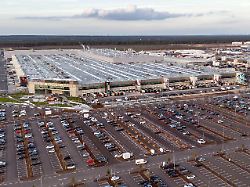Environmental impact really low?
Brandenburg demands changes to plans from Tesla
October 25, 2023, 6:36 p.m
Listen to article
This audio version was artificially generated. More info | Send feedback
There is no end to the criticism of the Tesla factory in Grünheide by many citizens. Now politicians are getting involved and demanding that the car manufacturer make improvements to its expansion plans. This is about possible environmental impacts, which the US company has so far downplayed.
The US electric car manufacturer Tesla is to partially change the application to expand the factory in Grünheide at the request of the state of Brandenburg. Tesla was asked to improve or supplement the application documents on individual points, said the spokesman for the State Environment Agency, Thomas Frey. This involves, for example, proving that nitrogen pollution in the EU nature and landscape protection area is harmless, as Tesla claims. The criticism from a hearing on the planned expansion of the factory should be incorporated into the approval review.
Tesla wants to double production in Grünheide from the targeted 500,000 cars per year to one million per year. According to Tesla, around 250,000 vehicles are currently produced per year. The storage capacity of battery cell production is expected to increase from 50 to 100 gigawatt hours per year. The company is submitting applications for environmental approval to the state of Brandenburg in three parts for the expansion. Around 11,000 employees work in Grünheide, and with the expansion this will increase to 22,500.
Environmentalists have concerns because the site is partly in a water protection area. Tesla wants to begin expansion in the first half of 2024 if possible – initially with optimizations to the existing factory and new buildings such as a wastewater treatment plant and a hazardous materials storage facility. According to Tesla, it wants to avoid early approvals as much as possible, as was the case with the construction of the first plant. It is still unclear when the first part of the approval will come.
In further stages, new buildings for car and battery production will be built, among other things. The State Environment Agency wants to first examine the criticism from a hearing with other authorities involved. “All authorities are taking the time they need,” said the spokesman for the State Environment Agency. “The decision will be formulated from this at the end.” There is currently no timetable for this. The hearing in Erkner surprisingly ended on Tuesday after less than two days. At the peak, more than 20 environmental and nature conservationists, residents and other people were present. More than a hundred people attended the hearing three years ago to approve the factory.
More than 1000 objections to Tesla
The impact of car and battery factory expansion on groundwater and water consumption were the most contentious issues. On Tuesday it was about pollution with fine dust, light and noise as well as nature conservation. The State Environment Agency previously received 1,073 written objections.
The head of the hearing, André Zschiegner, criticized the absence of associations. The Green League and the Association for Nature and Landscape boycotted the hearing because they criticized redactions and later updates to the application. The State Environment Agency said there was no public discourse about the points criticized as incorrect. The high level of professional competence of the nature conservation associations was missing. The authority hopes that this will remain a “one-off exception”.
In order to better connect thousands of Tesla employees, the Fangschleuse train station on the Berlin – Frankfurt (Oder) route is to be moved closer to the factory. The first trees were felled for this purpose. The Federal Railway Authority announced that it had issued a provisional order for the early felling of trees on October 19th at the request of Deutsche Bahn. The “Märkische Oderzeitung” had previously reported on it. The new station is scheduled to go into operation in 2026.
